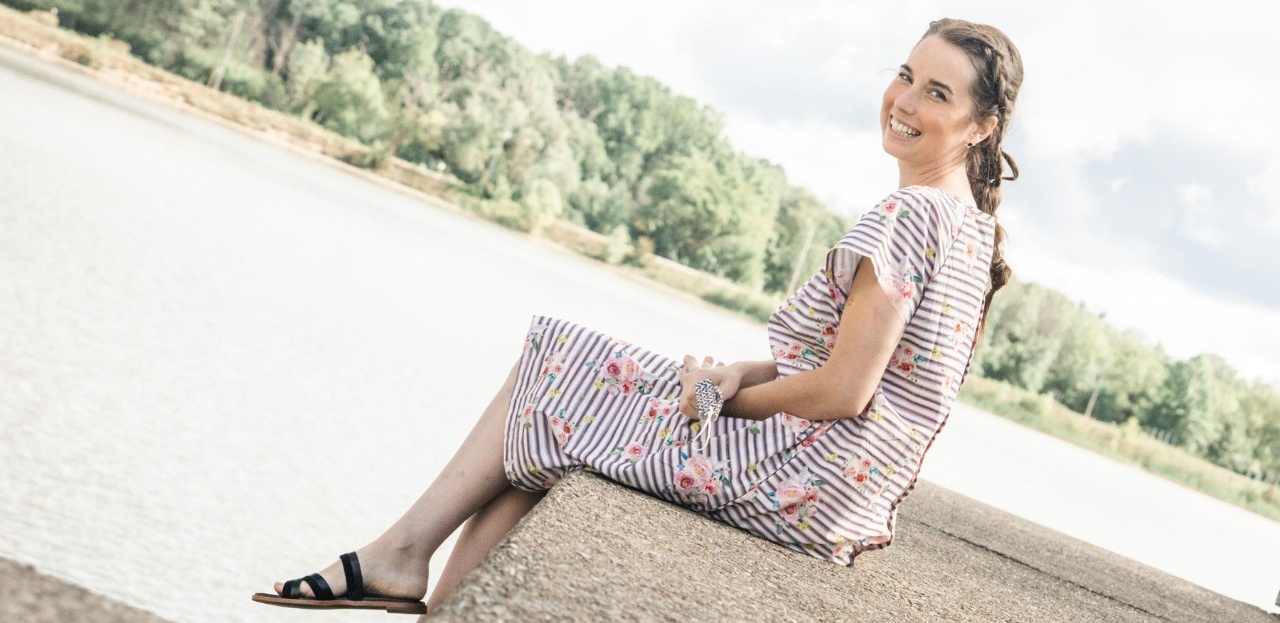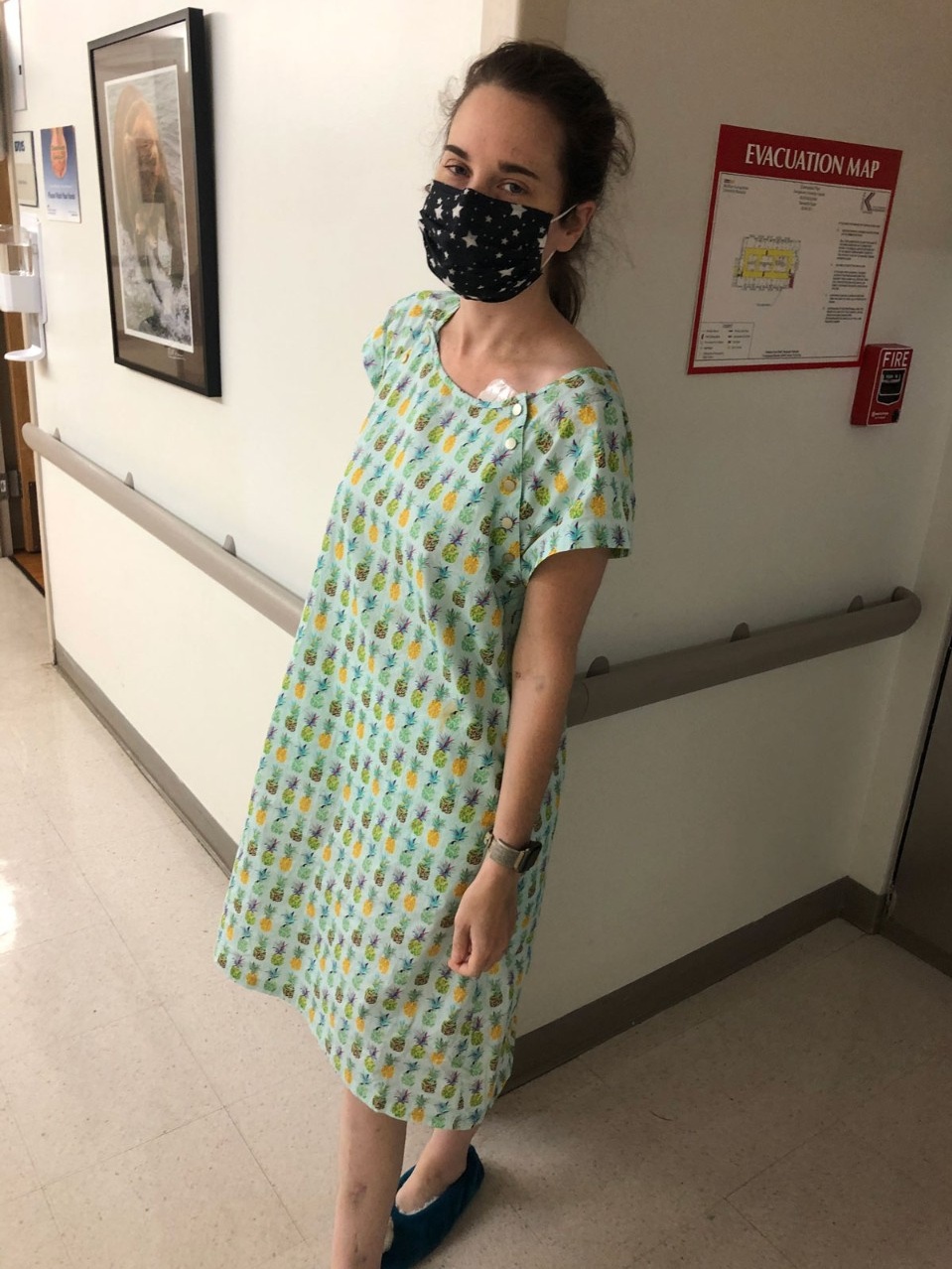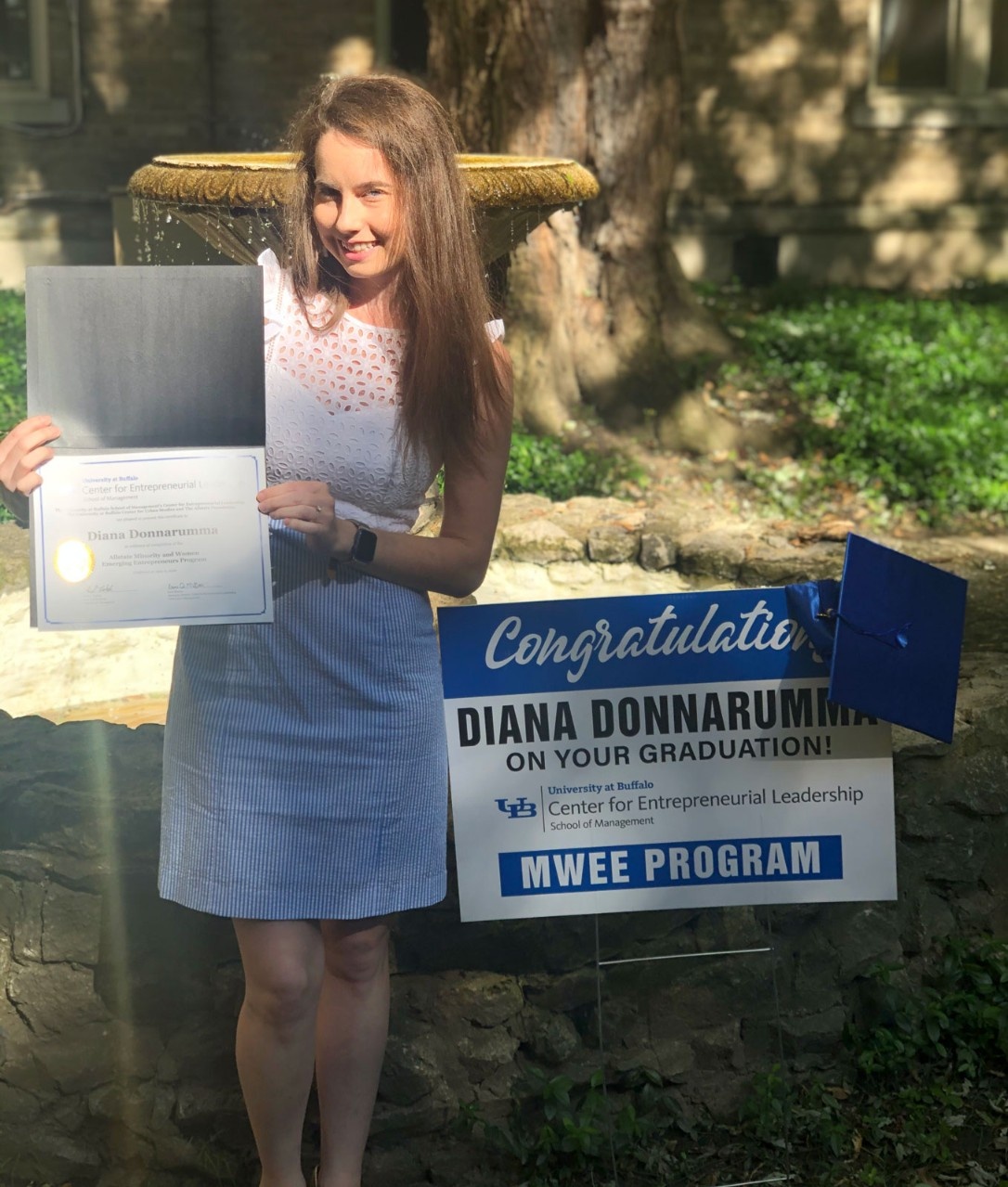Resilience in life and business
UB Center for Entrepreneurial Leadership grad empowers patients with her products
September 2020

Donnarumma at Baird Point on UB's North Campus. Photo: Paul O’Hara.
As an entrepreneur, Diana Donnarumma intimately understands the needs of her customers—individuals who live with chronic illness. That’s because she has spent the better part of the past six years in and out of hospitals, undergoing procedure after procedure.
Donnarumma in one of her newest products: a patterned hospital gown that's functional and full of personality.
In 2014, when she was a college junior, Donnarumma was diagnosed with dysautonomia, a condition in which involuntary body functions—digestion and heart rate, for example—may not work properly. The following year, another doctor diagnosed and began treating her for Lyme disease and chronic fatigue syndrome, but her symptoms continued to worsen until she wasn’t able to keep food down.
Finally, in 2016, Donnarumma was diagnosed with gastroparesis, a disease in which the stomach fails to digest food normally. Since then, she has had her colon and part of her stomach removed, undergone gastric bypass surgery and received a life-saving intestinal transplant. The latter is incredibly rare—in 2017, when Donnarumma received her new organs, only 109 intestinal transplants were performed across the country, according to the U.S. Department of Health and Human Services.
“Through this experience, I realized many things I thought were so critical really aren’t important at all. The most important thing in life is your family and letting them know how much you value them, because we don’t know what’s going to happen tomorrow,” says Donnarumma, who graduated last spring from the Allstate Minority and Women Emerging Entrepreneurs (MWEE) program in the University at Buffalo School of Management’s Center for Entrepreneurial Leadership (CEL).
Gaining confidence
During her illness and treatments, when she was unable to eat or drink normally, Donnarumma was put on IV nutrition and given an infusion backpack.
“It was black and very tacky,” she recalls. “It was not feminine and very cheap-looking, and just made me feel worse about my overall health condition.”
So, she and her mother, Debra, bought a cuter option from a department store and customized it to accommodate her medical equipment. When Donnarumma shared their creation in various Facebook support groups, requests came in from others wanting a similar bag, thus exposing a gap in the health care market.
“There should be an option for products that make people feel better about their illness and feel more normal, rather than having to hide it and becoming depressed,” she says. “At the end of the day, it’s all about quality of life, and if your medical product is hindering your self-love, then it has no place in your life.”
Donnarumma and her mother launched their business, Chronically Fit, in 2017, with Debra as the owner and Diana as the face of the company. Over the past three years, their backpacks, medical supply bags and medication coolers have reached customers around the globe, and this summer, after the MWEE program, they rebranded the company as Resilience Medical Supplies.
For Donnarumma, it’s her customers’ stories that empower her to keep pushing the business forward. One mother, for example, told Donnarumma that the day she received her backpack was the first day she ever picked up her children from school.
“That’s everything,” she says. “Giving her the confidence to do that—to share her love with her family and not be embarrassed by her illness—is why I started this business.”
Finding a network
Because of the coronavirus pandemic, Donnarumma and her classmates celebrated their CEL graduation virtually in June.
Last year, Donnarumma enrolled in the MWEE program, a joint venture of the CEL and UB Center for Urban Studies that helps minority and women entrepreneurs move their companies to the next stage of development. She hoped to learn best practices and meet other successful entrepreneurs—and says that’s exactly what the program provided.
“I knew networking was important before, but didn’t know where to go in the area,” she says. “CEL gave me a support network and the opportunity to connect with successful entrepreneurs, who have been a big asset to me and my business.”
Donnarumma’s mentor was Marie Rabin, owner and president of CARA Medical, who completed the CEL Family Business program in 2016. The two entrepreneurs instantly clicked, becoming close personally and supporting one another professionally.
“Diana is one of the most tenacious individuals I have ever met,” Rabin says. “Diana demonstrates a mature understanding of business principles, and her kindness, integrity, strength of spirit and character will serve her well in business and life.”
As the coronavirus pandemic took hold, Donnarumma pivoted her business to help medical supply companies like Rabin’s with sourcing much-needed personal protective equipment (PPE). Going forward, she plans to continue selling her bags and PPE, and recently launched a line of disposable hospital gowns in attractive prints—all to fulfill her mission of normalizing medicine and empowering individuals with chronic illness.
During the Allstate Minority and Women Emerging Entrepreneurs program, protégés work with a mentor, attend business development seminars and networking events, and complete a revised or newly developed business plan.

